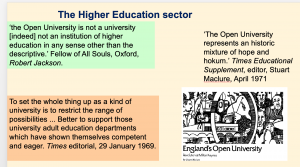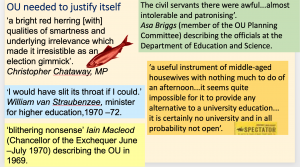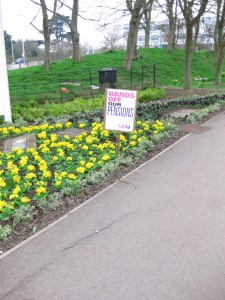Evelyn Rothschild
Saturday, February 8th, 2025Sir Evelyn Robert Adrian de Rothschild FKC (1931 –2022) was a British financier. In 1967, de Rothschild created the Eranda Foundation to support social welfare, promote the arts and to encourage research into medicine and education. The Eranda Rothschild Foundation gave 2010 17K and 2012 50K to the OU. Sir Evelyn also paid for a plaque to be placed in the Legacy Garden in memory of an ancestor who fought in the First World War.
After his death there were reports about an investigation into sexual misconduct in 2003. An internal memo (circulated in response to a Guardian article accusing him of sexual assault and harassment against women working in the bank in the 1990s) was published by the Daily Telegraph. It said that “no evidence’ had been found to support those allegations. Source: https://eur01.safelinks.protection.outlook.com/?url=https%3A%2F%2Fwww.bbc.co.uk%2Fnews%2Farticles%2Fc78wlx1lvqqo&data=05%7C02%7Cdaniel.weinbren%40open.ac.uk%7C253cc6d6215a4e6ca9e208dd48541199%7C0e2ed45596af4100bed3a8e5fd981685%7C0%7C0%7C638746248081066035%7CUnknown%7CTWFpbGZsb3d8eyJFbXB0eU1hcGkiOnRydWUsIlYiOiIwLjAuMDAwMCIsIlAiOiJXaW4zMiIsIkFOIjoiTWFpbCIsIldUIjoyfQ%3D%3D%7C0%7C%7C%7C&sdata=y4u3uz8RJAKZaqERVWVzW8Iuofd9P9%2BJFpfO0hyAjLo%3D&reserved=0
The Guardian https://eur01.safelinks.protection.outlook.com/?url=https%3A%2F%2Fwww.theguardian.com%2Fbusiness%2F2025%2Ffeb%2F05%2Fevelyn-de-rothschild-left-bank-in-2004-after-sexual-misconduct-complaint&data=05%7C02%7Cdaniel.weinbren%40open.ac.uk%7C253cc6d6215a4e6ca9e208dd48541199%7C0e2ed45596af4100bed3a8e5fd981685%7C0%7C0%7C638746248081087784%7CUnknown%7CTWFpbGZsb3d8eyJFbXB0eU1hcGkiOnRydWUsIlYiOiIwLjAuMDAwMCIsIlAiOiJXaW4zMiIsIkFOIjoiTWFpbCIsIldUIjoyfQ%3D%3D%7C0%7C%7C%7C&sdata=ewhah9sQqgSZR7cBTLbpizmZdHzSz1%2BvLKwhaGf3cWs%3D&reserved=0 reported that at least eight sources had alleged that Sir Evelyn used his position at the bank to abuse women who worked with him.



